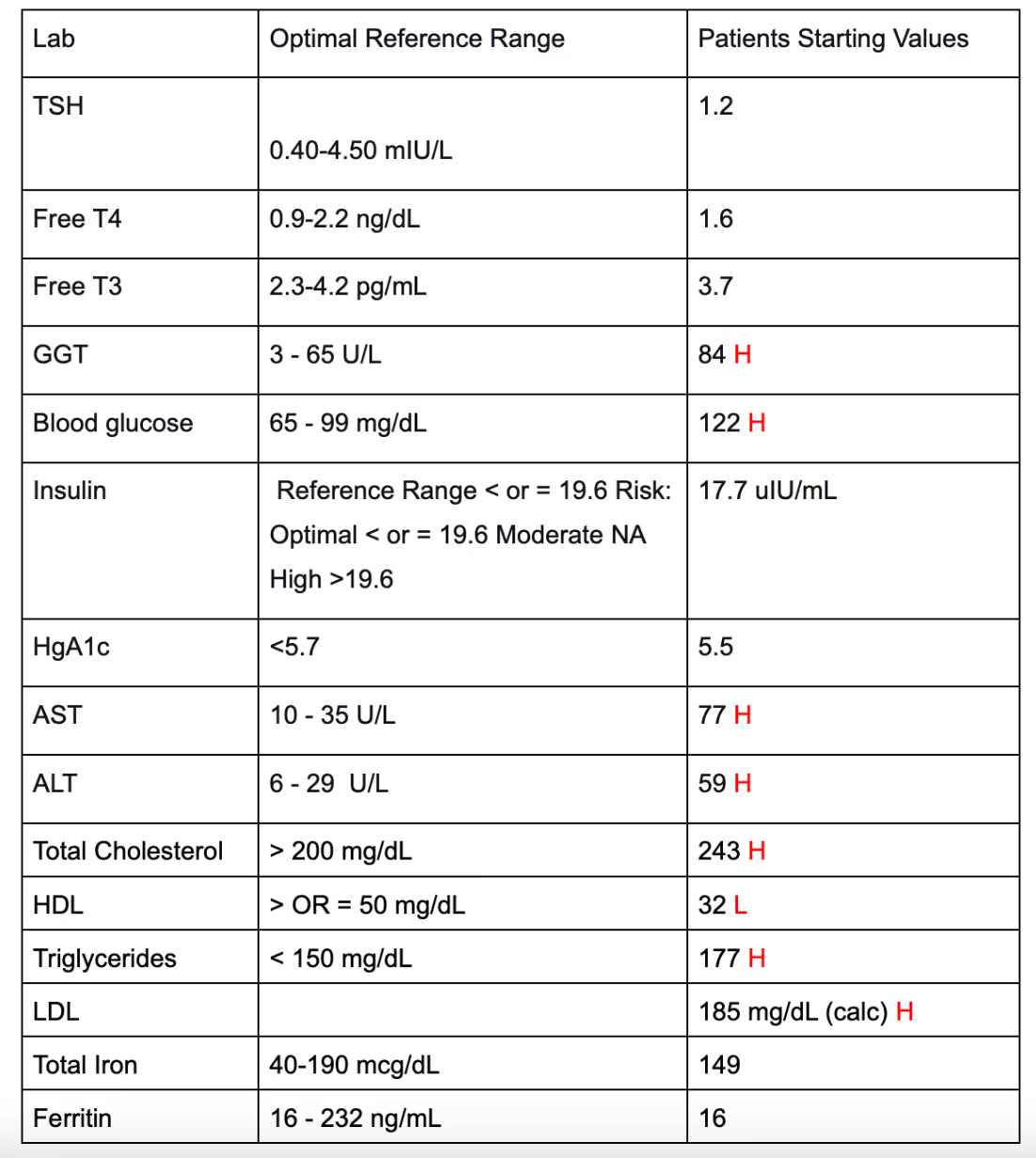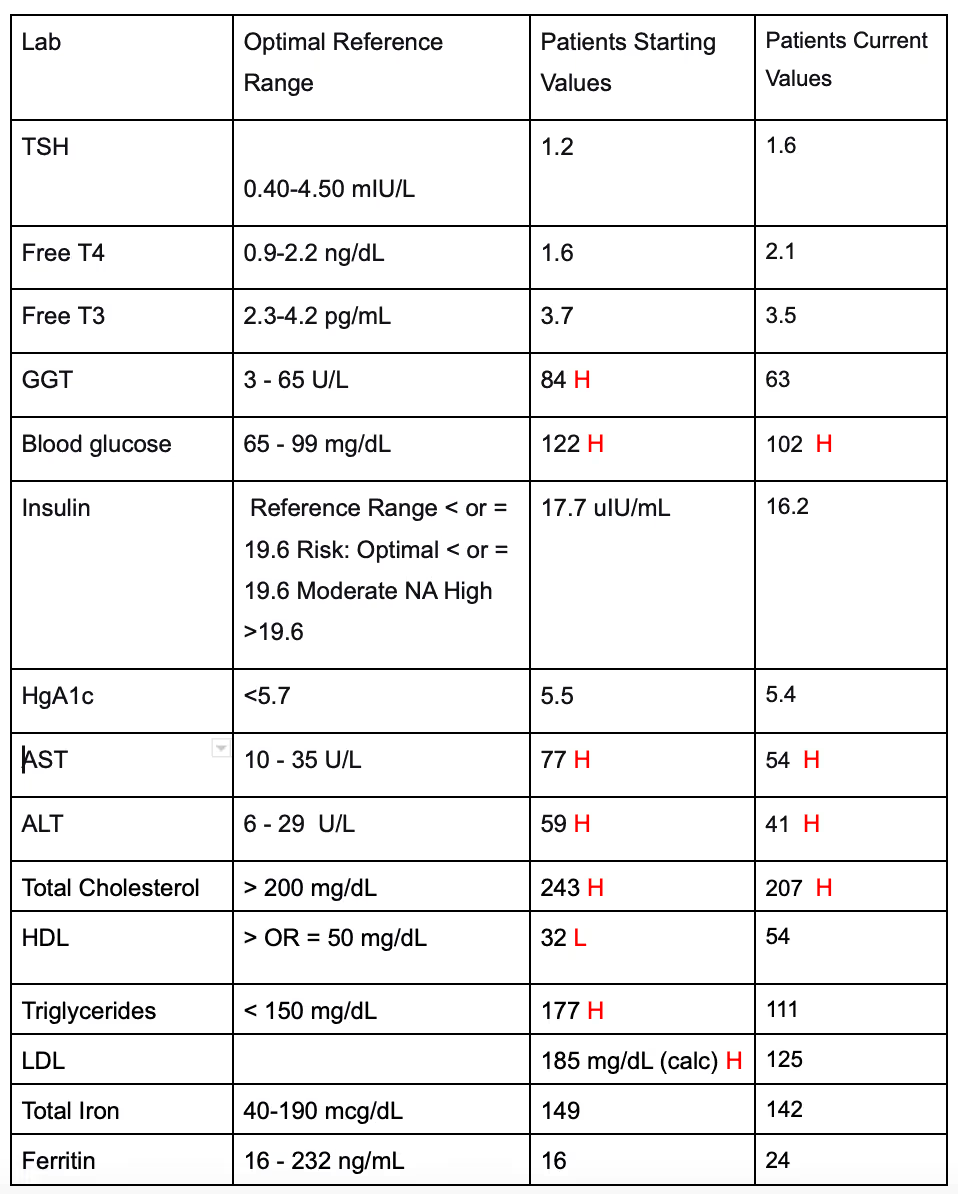Non-alcoholic fatty liver disease (NAFLD) is a common concern in individuals who are overweight, obese, pre-diabetic, and diabetic, regardless of age or gender. It is also known as steatosis, as NAFLD indicates increased fat accumulation in the liver cells, which can lead to inflammation and scarring. This condition may progress to non-alcoholic steatohepatitis (NASH), which requires careful management.
[signup]
CC: Fatigue, Irregular Heavy Periods, NAFLD
Sam was a 30-year-old female who experienced fatigue and irregular menstrual cycles since the birth of her first child 18 months prior. After stopping breastfeeding six months ago, she returned to a high-stress job and had poor diet and sleep habits. Her menstrual cycle returned at six months postpartum and was irregular, occurring every 1-3 months and lasting 5-12 days with heavy bleeding for the first four days.
Additional History
Sam was waking up 2-3 times a night with her baby and getting a total of 5 hours of restful sleep, according to the apple watch that she wore at night. She rated her energy during the day a 5/10 at its best and felt so tired after her workday that she needed a daily nap or she was falling asleep around 7 pm on the couch.
Her diet consisted of skipping breakfast and drinking 2-4 cups of coffee before noon, fast food for lunch, and dinner was half fast food and half home-cooked meal consisting of protein, a carbohydrate, and a side vegetable.
Initial Lab Work

- A combination salivary cortisol and hormone panel was also provided and showed mildly elevated testosterone, estrogen within range, and low progesterone. Cortisol profile showed mildly low levels throughout the entire day: all within the reference range but on the lower end of normal.
- CBC and the rest of the CMP were in normal ranges.
Lab Analysis
- Thyroid and cortisol panels were mostly within range; however, cortisol was on the lower end of normal, suggesting long-term stress to the adrenal glands. Due to the close relationship between the adrenal gland and thyroid hormones, a full evaluation of this pathway is recommended to understand the cause of the fatigue.
- Liver enzymes AST, ALT, and GGT were all elevated, suggesting liver cell stress consistent with NAFLD. The patient's cholesterol levels are also elevated, which may indicate liver inflammation and dietary-driven blood glucose issues.
- Blood glucose is elevated, and insulin is borderline, both suggesting possible insulin resistance and metabolic syndrome, which can contribute to NAFLD.
- The hormone panel indicates the patient may be experiencing symptoms consistent with PCOS (polycystic ovarian syndrome) with elevated testosterone and low progesterone. This finding aligns with the patient's irregular menstrual cycles, a common feature of PCOS.
Interventions
Nutrition
- Suggested she eat three balanced meals daily, focusing on 20 grams of protein, 1 serving of fat, ½ cup of grains/complex carbohydrates, and 2 servings of vegetables with each meal. Meal prepping was encouraged to reduce reliance on eating out and to minimize snacking between meals or after dinner.
- Discussed basic lifestyle support for cortisol signaling, including consulting a sleep expert for her 18-month-old daughter and sharing night responsibilities with her husband to reduce nighttime awakenings. A morning walk with her daughter was suggested for exercise and sunlight exposure, which may support cortisol levels. Coffee intake was reduced to 1 cup with breakfast, not on an empty stomach.
- Discussed reducing exposure to potential endocrine disruptors by minimizing fragrance and plastic usage and using a quality water filter.
Supplements
- Mediclear SGS protein shake: this contains 20 grams of protein and includes a nutritional profile of a multivitamin, ingredients that may support liver health like milk thistle, and compounds like curcumin and green tea extract that may help manage inflammation.
- Fish oil consisting of 1000 mg EPA and 750 mg DHA. This may support insulin sensitivity, help maintain liver health, and support healthy cholesterol levels while managing inflammation.
- 200 mg Silymarin/milk thistle 2x daily, paired with dandelion root tea 1-3 glasses daily, to support liver health.
- NAC 500 mg 3x daily to support insulin sensitivity and liver health.
- ALA 200 mg 3x daily to support insulin sensitivity and liver health.
Follow Up 3 Months Later

Sam’s labs showed improvement with dietary, lifestyle, and supplemental support. Her liver enzymes showed improvement, as did her cholesterol and ferritin levels, but further progress is needed to reach optimal health. She began working with a sleep consultant after our first visit, and she and her child were successfully sleeping through the night. As a result, her energy had begun improving, and she no longer needed an after-work nap and rated her daily energy level a 6-7/10.
Diet changes were initially challenging, so she began using a meal delivery service to focus on meal prepping for the week, ensuring dinner was ready when she got home. She noticed a weight loss of about 3 pounds and more regular bowel movements.
Her menstrual cycle was now occurring every 40 days, with five days of heavy bleeding.
All supplements and dietary support were continued, and additional vitex/chaste tree was introduced for ongoing progesterone and HPA axis support.
Follow Up 6 Months Later

Sam's labs continued to show improvement six months into her new routine. She rated her energy at 8/10 and began lifting weights at the gym with her husband. She was sleeping more deeply and waking more rested, and she even cut out coffee entirely. Her menstrual cycle became monthly, lasting five days with reduced severity of bleeding. She was pleased with the results and began transitioning her care to prenatal support as she was considering pregnancy again soon.
Summary
This case illustrates how addressing lifestyle factors such as stress, sleep, and diet can support overall health. Sam presented with fatigue and irregular cycles, but further investigation highlighted NAFLD as a primary concern. By managing stress, improving sleep, and making dietary changes, along with baseline supplementation, she was able to support her hormone, liver, and blood sugar balance.










%201.svg)











